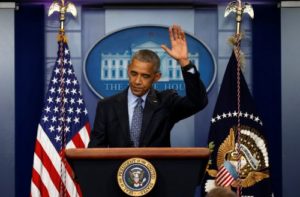Ricochet is the best place on the internet to discuss the issues of the day, either through commenting on posts or writing your own for our active and dynamic community in a fully moderated environment. In addition, the Ricochet Audio Network offers over 50 original podcasts with new episodes released every day.
 So Did Obamanomics Work or Not?
So Did Obamanomics Work or Not?
 How to evaluate the economic record of Barack Obama? To even begin answering, it’s necessary to go beyond just counting the number of jobs created during his presidency (10 million) or calculating the average growth rate (1.5%) or even looking at something more wonky like the labor force participation rate.
How to evaluate the economic record of Barack Obama? To even begin answering, it’s necessary to go beyond just counting the number of jobs created during his presidency (10 million) or calculating the average growth rate (1.5%) or even looking at something more wonky like the labor force participation rate.
First, a president’s policy actions may take years to play out. Reaganomics didn’t move the needle on productivity growth during the 1980s. But maybe they helped set the stage for the 1990s boom. The US economy is a complicated piece of business. Its deeper structural components are altered neither easily nor quickly. Will universal healthcare — or whatever form it morphs into under the GOP — make us healthier, or promote entrepreneurship? Will Dodd Frank prevent future financial crises or constrain lending or both?
Second, even evaluating policies meant to have immediate impact is hard. Consider the ongoing debate about the 2009 stimulus plan. Sure, there are models purporting to show this or that many jobs created or GDP percentage points added. But there was also a lot else happening back then, including unorthodox monetary policy and a dramatic regulatory expansion.
Third, there are also long-term macroeconomic trends to consider. Demographic factors suppressing GDP growth today and nudging down labor force participation rates didn’t emerge in 2009. Likewise, weak US productivity growth — as official measured — also predates the Obama years. These observation has given rise to various flavors of theory that the US economy is suffering from chronic “secular stagnation.” Was there something special about the Great Recession and Financial Crisis that probably precluded a more robust recovery?
Fourth, there’s the rather large matter of the Great Recession and Financial Crisis. Obama inherited a nasty economic mess. But so did other presidents, such as Ronald Reagan. Was there something special about the Great Recession and Financial Crisis that probably precluded a more robust recovery? That would seem a pretty important determination to make.
Example: Research from my AEI colleague Robert Barro suggests severe downturns — even when accompanied by financial shock — are typically followed by stronger recoveries. Others disagree. Economists Carmen Reinhart and Kenneth Rogoff argue recessions accompanied by systemic shocks to the banking and housing systems tend to be followed by painfully sluggish recoveries. It was a “crisis greatly amplified by financial market breakdown,” Rogoff has written. And from that perspective, “the post-2008 U.S. recovery has not been unusually weak or prolonged,” argues Goldman Sachs.
Yet from either perspective, policy was likely suboptimal. For his part, Barro thinks the recovery could have been faster had there been more pro-productivity policies reducing “constraints” on market activity: deregulation, tax reform, infrastructure upgrades, freer trade. And as Rogoff sees it, “more vigorously pursued debt write-downs” and even more aggressive monetary policy would have been helpful. Even so, the role of the Bernanke Fed is often downplayed by those crediting Obamanomics from preventing an even worse downturn.
For now, at least, I prefer to learn what I can from the Obama years and focus on the challenges at hand to expand work and boost productivity to create sustainable growth benefiting the broad swath of Americans. Growth can be faster, mobility higher, opportunity greater.
Published in Economics



Regarding the Obama economy and those 10 million jobs. I read another statistic today that throws shade on those jobs. It seems that, in just revised statistics, the Department of Education now reports that five years after graduation, OVER HALF of all student loan borrowers have yet to repay even $1.00 of the principal amount borrowed. Over half.
That flies in the face of ’10 million jobs created’. Unless of course the vast majority of those jobs are part time or minimum wage.
No.
Here’s a summary: He sucked.
Doubled the national debt. Never got 3% growth.
Fail.
I think it is a sold point, the economy is complicated and no one person should be held responsible for it. I always find it interesting that good people who quote Milton Friedman’s “no one knows how to build a pencil” argument then say that Obama is responsible or Bush is responsible for the economy. It is better to say that Obama’s policies may have hindered growth or prevented hiring or investment etc. Big blanket statements are too simplistic to be true and thus are easy to disprove. I suspect that in the years ahead we will see a rebound to the degree to which markets either adjust to regulation or to the degree to which they are deregulated or innovated. But it will be a hard thing to prove that cause and effect relationship, there are simply too many moving parts. Nobody knows how to …. you know the rest.
One issue I would like to see addressed is whether an increasing number or proportion of workers are moving into the second economy, due to overregulation and the stagnation in the official economy. Estimates in sub-Saharan Africa average 40% of total economic activity (probably low), but I haven’t seen any thoughtful discussions of shifts here (though explosion of air bnb & uber suggest a broad scope for expansion).